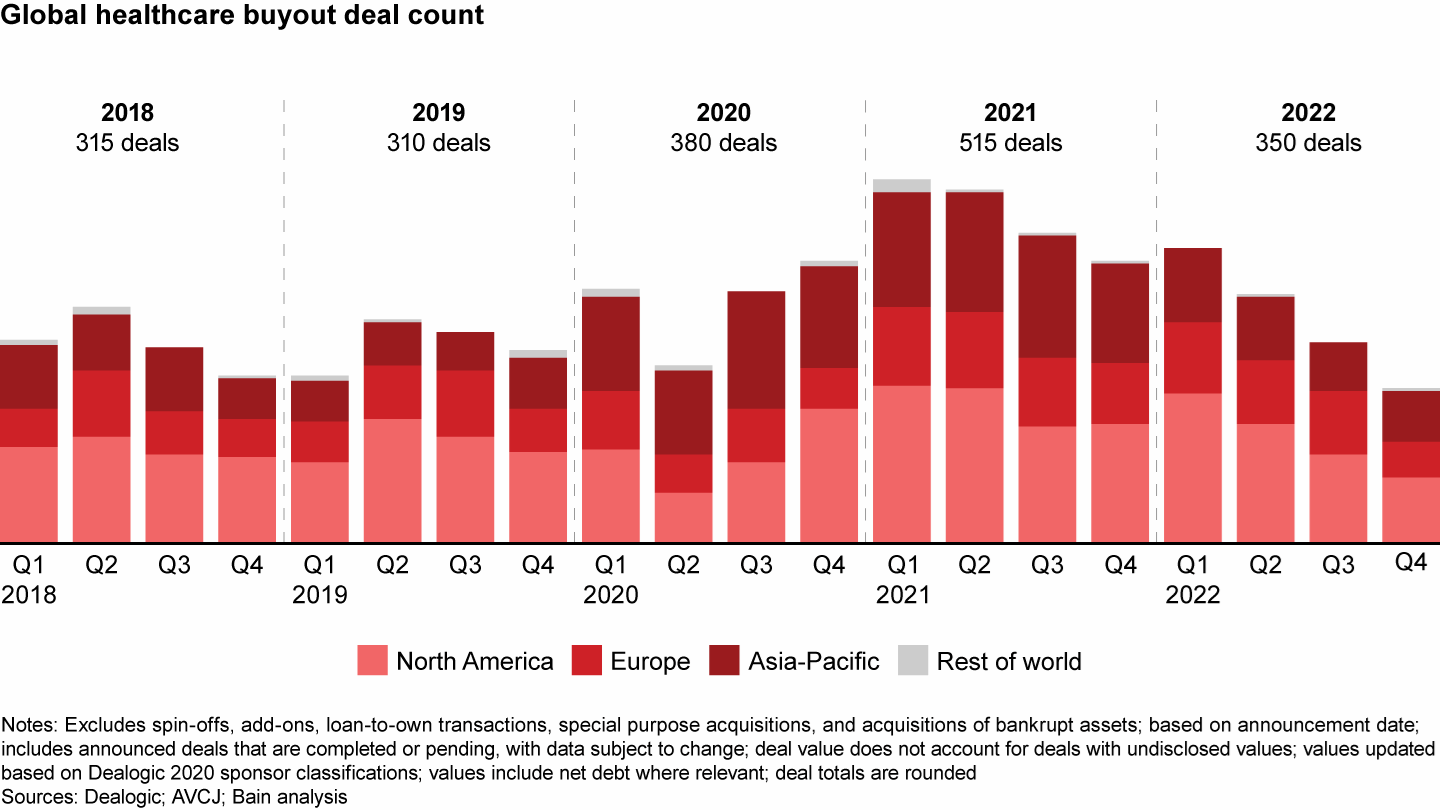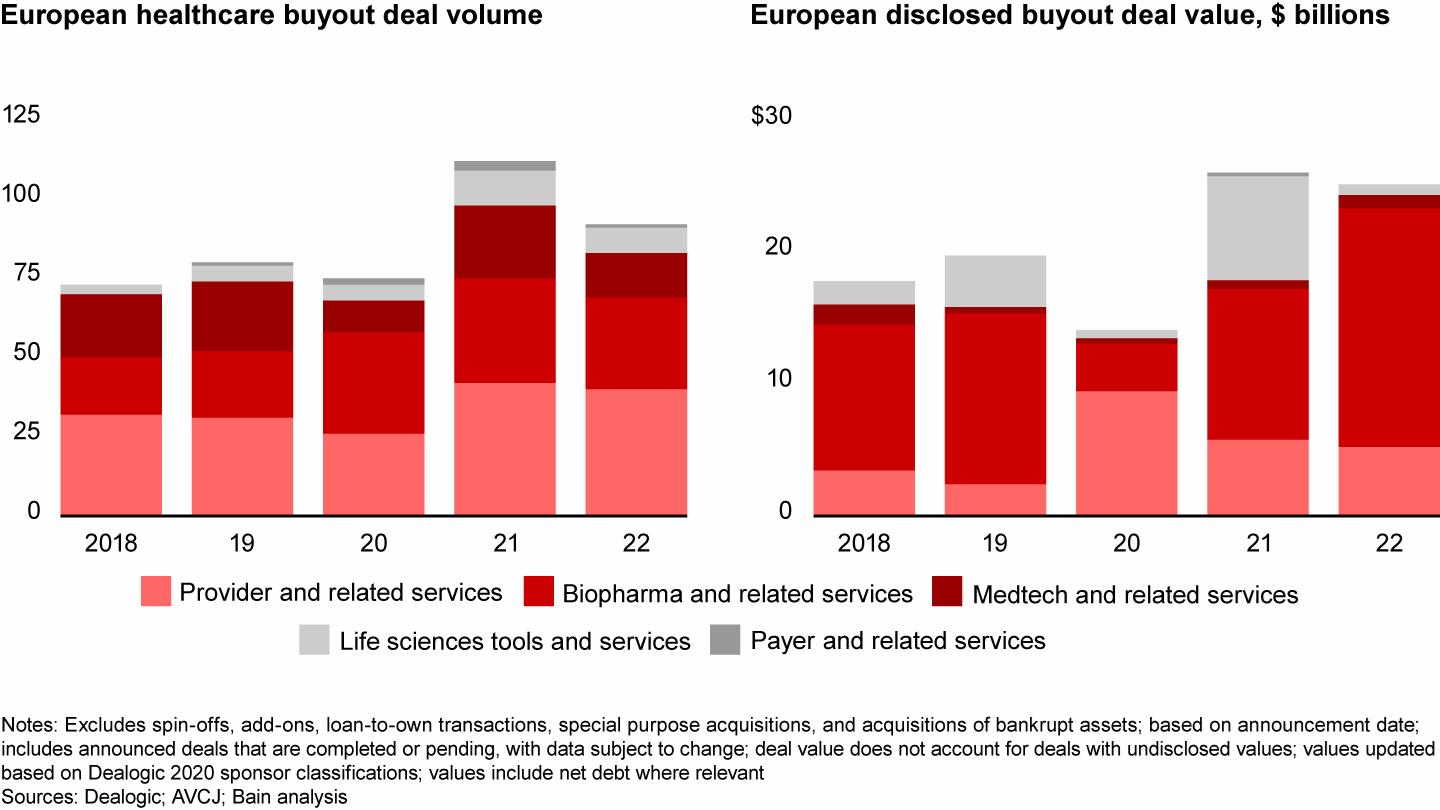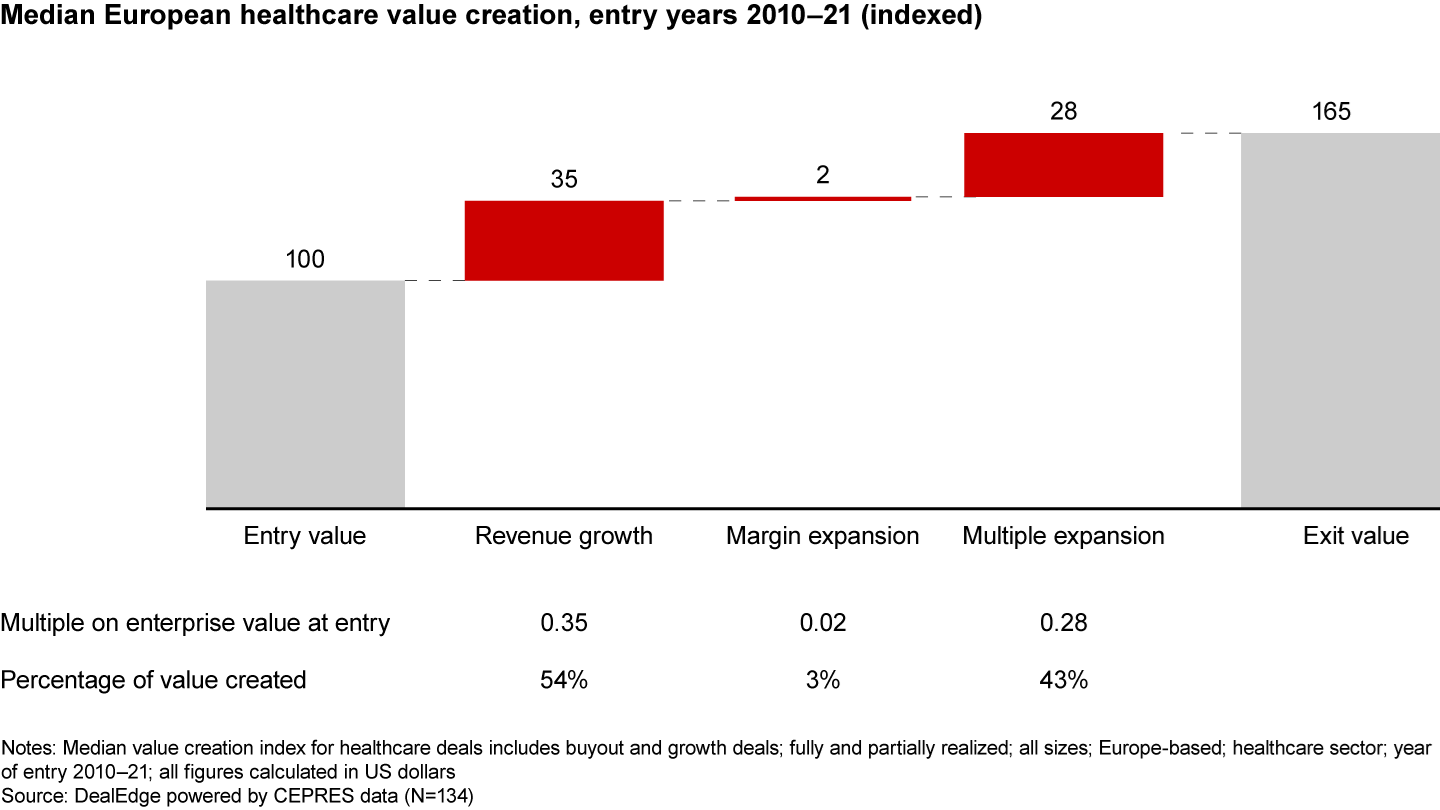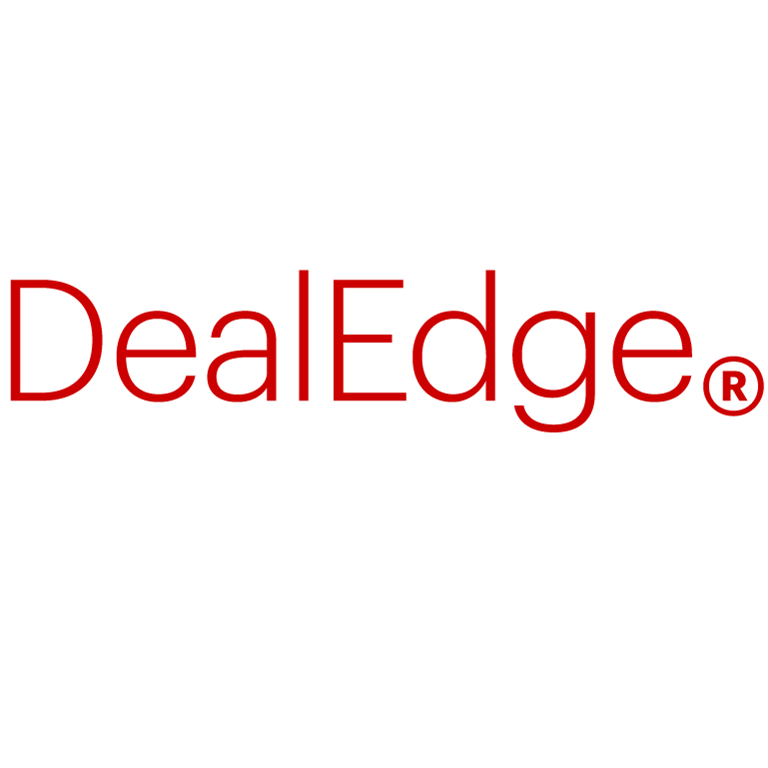Global Healthcare Private Equity Report

At a Glance
- The first half of 2022 saw near-record levels of buyout activity, but deal numbers and values fell sharply in the second half as macroeconomic challenges mounted.
- Biopharma and related services deal value enjoyed a record year, demonstrating impressive breadth of coverage.
- Deal volume in retail health and services to providers remained robust as the segment continues to mature.
- We expect private equity to gravitate toward opportunities for operational improvement and assets with strong technological differentiation.
This article is part of Bain's 2023 Global Healthcare Private Equity and M&A Report.
The first half of 2022 was one of the best on record for healthcare private equity in Europe. Buyout volume in the first half upheld the record pace set in 2021, with nine deals in excess of $1 billion, accounting for three-quarters of the $25.3 billion in disclosed deal value announced in 2022.
The second half of the year, however, told a very different tale as the impact of global events made itself felt (see Figure 1). The same macroeconomic trends affecting other regions—uncertainty in the wake of Russia’s invasion of Ukraine, rising inflation, tight credit markets, taut healthcare labor markets, and depressed public equity markets—hurt European buyout activity. As a result, there were far fewer large ($500 million-plus) buyout deals, and total disclosed deal value for the region amounted to roughly $3 billion.
Healthcare activity in 2022 saw year-over-year quarterly declines across all three regions


Biopharma and related services: record year in deal value
The biopharma and related services sector, historically, has been a key driver of disclosed European buyout deal value. In 2022, the sector posted record numbers, representing more than 70% of disclosed deal value (see Figure 1). Sector breadth impressed equally, with transactions that ranged from high-end science to generics to over-the-counter drugs.
Services continued to be an important biopharma subsector, with multiple distribution and contract development and manufacturing organization (CDMO) assets transacting. The largest CDMO deal of the year was Astorg Partners’ acquisition of CordenPharma, a producer of active pharmaceutical ingredients (APIs), excipients, drug products, and associated packaging services (about $2.6 billion). Notable distribution deals included EQT and Mubadala’s acquisition of Envirotainer, an air-transportation solution for temperature-sensitive pharmaceuticals (around $3 billion). Similar to 2021, there were only a few healthcare information technology deals in the sector, the most prominent of which was Warburg Pincus and Mubadala’s acquisition of Informa’s Pharma Intelligence business (rebranded as Citeline) for approximately $2.6 billion. Norstella, which is backed by Hg Capital, Welsh, Carson, Anderson & Stowe, and Warburg Pincus, ultimately added Citeline to its pharmaceutical technology platform via merger.
European retail health (provider and related services sector) and biopharma and related services sectors proved robust in deal volume and value


Several factors led to biopharma and related services’ record numbers in 2022. First, European biopharma investors continued to have access to a pool of mature, non-PE-owned assets; in 2022, over 40% of sector deals were private-to-sponsor transactions. For example, Goldman Sachs bought a majority stake in leading specialty pharmaceutical company Norgine following more than 110 years of family ownership.
Second, sponsors built expertise in biopharma and life sciences, and funds continued to become more specialized around the sector. This capability allowed biopharma-focused funds to grow more comfortable in understanding their risk exposure. For example, life-sciences focused investor GHO Capital Partners invested in RoslinCT, an autologous and allogeneic cell therapy CDMO based in the UK.
Third, earlier stage life sciences investments are beginning to pick up traction in the region. Carlyle acquired Abingworth and created a dedicated operating company, Launch Therapeutics, to create a life sciences investing platform. EQT completed its acquisition of LSP and launched it under a new name: EQT Life Sciences. Large funds interested in biopharma and related services assets are starting to take notice of smaller midcap funds whose primary assets are ready to reenter the market.
Finally, the European biopharma market benefited from the region’s favorable dynamics regarding generic pharmaceuticals. Investors who are able to understand and underwrite country-specific regulatory and reimbursement models can find assets with strong country go-to-market capabilities allowing them to have sustainable 20%–30% EBITDA margins. TPG played into this trend with its acquisition of DOC Generici.
Deal volume in retail health and services to providers remained robust as the segment matures
The majority of the provider and related services sector in Europe was composed of retail health deals, followed by healthcare information technology and other services. A proliferation of smaller deals made it the largest sector by volume in Europe, driving overall deal count numbers for the region.
Retail health accounted for 2 of the region’s top 10 deals by value—the only two nonbiopharma deals that made the list. Spanish fertility clinic chain IVIRMA Global was acquired by KKR for roughly $3.2 billion. Affidea, an advanced diagnostics, outpatient, and cancer-care services provider, was acquired by Groupe Bruxelles Lambert for around $1.1 billion.
Outside of these megadeals, roll-up activity in retail health persisted. Retail health returns over the past decade have been driven by revenue growth, and roll-up activity is a proven way to buy growth. For example: Innova Capital continued to consolidate the Polish dental sector with the purchase of two dental clinic chains in 2022, Medicadent and Dentaurus.
We expect PE to gravitate toward opportunities for operational improvement and assets with strong technological differentiation
Our analysis of deal returns indicates that European healthcare private equity (HCPE) investors have relied on revenue growth and multiple expansion to drive returns over the past decade (see Figure 2). In contrast, margin expansion has not been a meaningful contributor to investor returns. Within the region years of 2010 to 2021, revenue growth was responsible for 54% of healthcare private equity value created, multiple expansion was responsible for 43%, and margin expansion only 3%.
Revenue growth and multiple expansion boosted European deal returns


Moving forward, these value creation levers may be challenged in certain healthcare sectors in Europe. First, the increased cost of borrowing will make revenue growth through M&A activity more challenging. Second, wage inflation and inability to pass on rising costs to customers threaten to constrain margin expansion in the near term. Third, overall valuations for public listings in the market have decreased, making the multiple expansion story more difficult for investors to count on. One sector, in our view, that will be particularly affected by these trends is provider and related services—specifically retail health. Inorganic revenue growth from M&A will slow while government-regulated pricing becomes increasingly insufficient to keep pace with the rapidly increasing costs of labor. Additionally, for those companies that charge customers out of pocket, competitive pressures will make achieving price increases progressively more difficult. These factors are likely to impact retail health valuations and deal activity in the short term.
However, these same macro conditions will create pockets of opportunity. Winning private equity firms will be prepared to actively contribute to steering management teams toward operational efficiency. Within the European healthcare private equity industry, we predict that margin expansion will gain share in terms of percentage of HCPE value created in the region. At the same time, assets with true technical differentiation will be less affected by adverse market conditions and may be better shielded from near-term multiple compression.

DealEdge Sector Study: Healthcare Private Equity
DealEdge® is the private equity industry’s leading provider of deal-level performance and operational analytics. Get groundbreaking deal-level analysis of PE healthcare performance, value creation, and more in our latest report. DealEdge’s inaugural Sector Study covers 1,500 deals across 62 healthcare subsectors, ranging from Retail Health to MedTech. Download now.